 Some residents in Houston and Dallas are furious at AT&T and its contractors for causing major damage to homeowners’ property, in one case burning down a Houston family home after accidentally hitting a natural gas line that resulted in a fire.
Some residents in Houston and Dallas are furious at AT&T and its contractors for causing major damage to homeowners’ property, in one case burning down a Houston family home after accidentally hitting a natural gas line that resulted in a fire.
Joyce Skala’s home in Cypress was seriously damaged in a fire just before Thanksgiving 2017 and almost three months later, Skala says AT&T and its contractors won’t talk to her about the damages and who will pay for them.
“Everything you look at when you leave your house in the morning, it was gone,” Skala told KPRC News after the Nov. 14 fire. “I have not heard from a soul — not one. Not even a representative of a representative.”
The damage was not an isolated incident. KPRC noted two days later, AT&T’s contractors damaged an electric line in Shelli Moore’s yard in a different neighborhood, causing a power outage. Repairing the damage will cost her almost $2,000, and so far, Moore appears to be left holding the bill.
“That would break me,” she said. “I have no idea where I would come up with that kind of money, but we have to have lights and heat,” Moore said.

Joyce Skala’s home, destroyed by fire after an AT&T contractor hit a natural gas line (Image: KTRK)
In the Dallas-Ft. Worth area, utility workers made themselves right at home at Norma Logan’s home, using her back patio as a dining area and completely “trashing” her backyard.
Logan came home to find AT&T digging a deep trench along her back fence, damaging sections of it, as well as destroying her personal property. Then they left without a word.
“They broke many things out there,” Logan told KTVT. “They broke the fence. They broke the statue. They broke some of the things that I use to decorate the flower bed.”
A day later, the workers returned unannounced, this time with heavy equipment that continued to tear up her yard. But before getting to work, they spent a leisurely breakfast at her patio table just outside her back door. They didn’t bother to clean up after they finished.
The subcontractor responsible in these cases was NX Utilities, which has piled up a number of complaints against it since last fall. But AT&T appears to still be using the company to construct its fiber to the home network in both cities.

Contractors left evidence of their presence behind. (Image: Logan)
Anni Shugart’s Cypress home was damaged by an electric surge, and AT&T didn’t want to talk to her about the damage to her home either.
“I couldn’t get anywhere with AT&T,” Shugart said.
Shugart, like others, was left holding the bill after AT&T denied her claim, suggesting they are not responsible for the damages. They pointed her to NX Utilities, but that didn’t make much difference either so she called her insurance company, which is covering her repairs, except for the $4,500 deductible she is paying out of pocket.
“Well, I hope I’ll get it back eventually,” she said. “It’s a lot of money.”
Two days later, contractors hit another gas line. Four days after that they cut another underground power line.
“People in my neighborhood are mad at AT&T,” homeowner Pam Grossman told KPRC.
AT&T claims that it is not directly responsible for the damage, because it was caused by its third-party contractor NX Utilities. In fact, NX is just one of several layers of contractors working on AT&T’s fiber project, and in the event of a problem, the contractors are excellent at pointing fingers at one another.
KPRC reports when the fire marshal turned up to investigate the fires, the report included claims from contractors blamed each other while holding themselves harmless.
“There was no way that his company was involved in the fire,” said the owner of Connect Links in the fire marshal’s report.
KPRC in Houston reviews the damage being done in the Houston area by AT&T’s subcontractors managing the company’s fiber buildout. (3:58)
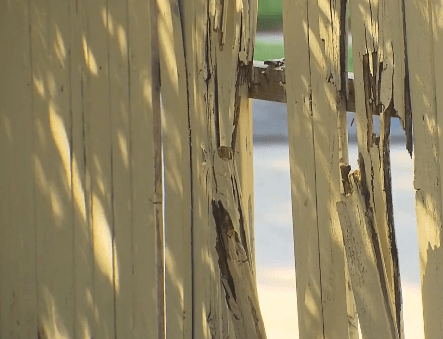
AT&T contractor NX Utilities allegedly damaged Norma Logan’s fence in the Dallas-Ft. Worth area. (Image: KTVT)
AT&T won’t say how many damage reports about it or its contractors have been filed in Houston and Dallas-Ft. Worth. But AT&T did say it was doing both cities a big favor by enabling them for gigabit fiber internet, and regrets the problems that have developed along the way.
“Our goal is to minimize impact on residents before, during and after construction and to keep them informed through a variety of means throughout the network expansion process,” AT&T said in a statement. “If construction-related issues do occur, we work quickly to resolve and restore any impacts from our work.”
The key emphasis is “our work” and AT&T feels its subcontractors are responsible for fixing their own problems.
“Whether large or small, these damages impact the public and that is not lost on us,” AT&T said. “We track damages and other issues and review performance with our contractors performing the work. As we identify poor performers, we cull those out. Damage can occur for a number of reasons, from contractor error to locates not being accurate. Before we begin a project, we talk with locating firms to provide them with some high-level visibility into where we anticipate completing work on a regular basis. Furthermore, as a part of the large project locate process, we typically provide 30-60 days’ notice versus the minimum 10 days.”
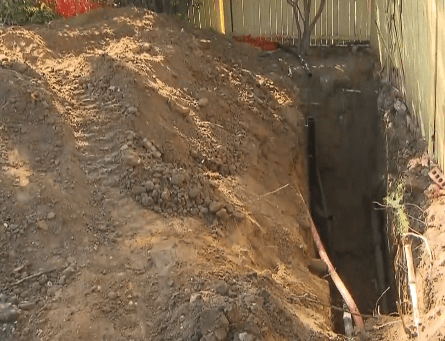
Logan discovered utility workers dug this trench in her backyard along the fence line. (Image: KTVT)
AT&T says projects of this large size and scope require careful planning and implementation, and the company has gotten significant experience managing fiber upgrades in a number of cities where it provides telephone and broadband service.
“We have dozens of supervisors and inspectors in the field to ensure our contractors are performing to our standard,” said AT&T. “We work closely with city officials to ensure our work is done in a timely and orderly fashion. Our contractors are trained to obtain proper permitting, closely follow local construction codes, and abide by rules governing rights-of-way and property easements.”
But many homeowners report they never got any advance notification about the construction work and even less often understood how it would impact on their property.
Logan said she received no notification, despite claims by NX it placed fliers on her door. But those fliers said nothing about heavy construction equipment being brought in, driven over grass and into a cramped backyard to dig. Logan was incensed as she watched equipment dig a trench several feet deep along her backyard fence line, ruining some of her lawn ornaments and damaging her fence.
A second day of empty coffee cups and fast food wrappers left on her patio table was also an unpleasant reminder of their presence.
NX later claimed they reprimanded their workers, not for the damage done to her property, but for not cleaning up their trash as they left.

The sudden arrival of heavy equipment attempting to navigate into Logan’s backyard only upset her further. (Image: KTVT)
AT&T is not the only telecom company that receives criticism for property damage while installing fiber cables. Google Fiber generated “hundreds of complaints” in the Austin area for construction mishaps, including alleged flooding from backed up storm drains that damaged multiple properties. In Charlotte, N.C., Google was accused of causing damage to water wells and allegedly struck a sanitary sewer, flooding a home with raw sewage.
Since September 2015, Charlotte city officials have cited contractors for ordinance violations more than 40 times for $21,300, data show. That included $14,200 in general violations and $6,700 for closing a portion of a right-of-way without the proper traffic control. Fines ranged from $100 to $1,800. Ansco, a contractor for AT&T, was cited the most: 17 times for $8,400. Bechtel, which does work for Google, was cited six times for $2,100, including fines that also mentioned another subcontractor.
How to protect yourself
If a company is performing work involving installation of underground cables, that carries the greatest risk of potential damage to property or other utilities. Many mishaps are caused by inaccurate maps that purport to show where other underground utilities are installed. In some areas, those maps are incomplete or wrong. In the United States, these problems are so serious that there is a nationwide free hotline – 811 – available to consumers and contractors for free on-site location flagging of where underground utilities are actually located.
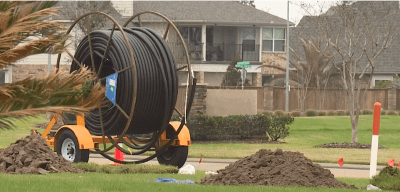
AT&T is installing fiber optics in several Texas cities.
You can request your own site survey at no charge and photograph the results for your records.
Here is how to request a site survey:
- Call 811 from anywhere in the country at least two days before digging and your call will automatically be routed to your local one call center. Visit the 811 service state map to see if your local one call center accepts online requests.
- Give the operator information about how to contact you, approximately where you or a contractor will likely dig, and what type of work will be done. If you don’t know all the details, that is okay. Request a general assessment of where utilities have placed their cables on or near your property and let 811 know a contractor hired by the telecom company will be doing the work independently.
- Utility companies who have potential facilities involved will be notified of the imminent arrival of a contractor preparing to dig on or near your property.
- Each affected utility company will send a location team to mark the approximate location of underground utility lines. Sometimes they spray paint the location on grass or pavement in different colors reflecting the service. In other cases, they plant small plastic flags in a line where the cabling is located. This typically occurs within 2-3 working days, but some states may have different rules. To access specific information about your state, visit the 811 state map.
 Contractors are usually required by ordinance to notify you in advance of any utility work that is done on or near your property. This notice is usually in writing and can be a mailed or placed flier or a doorhanger card. Retain this notification until the work is complete. It will generally include contact information about the company doing the work and what to do in case a problem arises, and most importantly, who to contact.
Contractors are usually required by ordinance to notify you in advance of any utility work that is done on or near your property. This notice is usually in writing and can be a mailed or placed flier or a doorhanger card. Retain this notification until the work is complete. It will generally include contact information about the company doing the work and what to do in case a problem arises, and most importantly, who to contact.
Prior to the arrival of the construction crews, photograph your yard to document its current condition. Make sure to get clear photos along property lines or easements, documenting the condition of fencing, landscaping, and any pre-existing structures. If damage occurs, you will have before and after photos to show the contractor, town officials, and/or your attorney.
If possible, stay home on the day work is being done. Making your presence known will greatly reduce the chance utility workers will be careless with your personal property or how they conduct themselves. Document any suspicious or disturbing activity by taking video on your cell phone. Watch for workers attempting to access areas of your property unaffected by the work. They do not have the right to use your outdoor furniture for lounging or eating. They also do not have the right to relieve themselves in your yard.
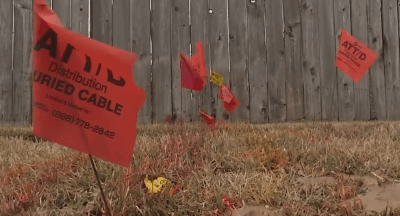
Buried wire flags
In every case, they are responsible for reasonably restoring your property to the same condition it was in before they arrived. That means repairing ruts or reseeding disturbed portions of your lawn, repairing or replacing damaged items like fencing, lawn ornaments, buildings, and other personal property. If they damage or kill a tree, they are responsible for removing and replacing it, if it was located on your property and not in an easement (in those cases, contact your local town or city officials and ask how to proceed.)
If you discover damage to another company’s infrastructure (or public utilities), call the affected company or public utility right away. They will need to document the damage and arrange for repairs. If a utility power line is knocked down or damaged between the pole or yard pedestal and your home, some companies may require you to hire a private contractor to replace the line. You will want to notify the contractor that did the damage about the incident and begin documenting the process to receive reimbursement.
It is not your responsibility to navigate a company’s complex maze of contractors and subcontractors. Contact the telecom company doing the work and insist they identify the contractor involved and agree to liaison with you to get the matter resolved quickly to your satisfaction. They cannot walk away from their responsibility to correct damage just because they chose to hire an independent company to perform work on their behalf.
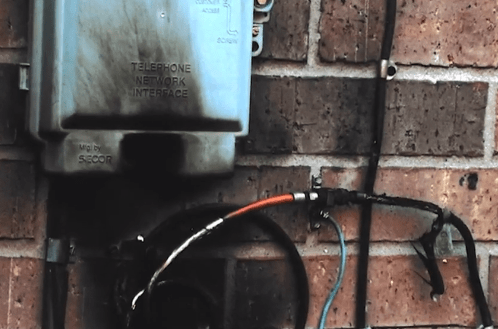
When an AT&T contractor hit a utility line, it caused a power surge damaging homeowners’ utility boxes and outside walls. (Image: KPRC)
KPRC asked Texas real estate attorney Nikolas Spencer about who is responsible in these cases according to Texas state law.
“All of them are,” he said. “If they know that this particular subcontractor is routinely causing fires at people’s houses, or even just nicking the lines themselves, that’s a repeated and dangerous situation that AT&T is on notice as happening. They’re responsible for that.”
Your municipality may be willing to share violation details about contractors performing work in your area. If you can document repeated instances of careless work or violations, that can be strong evidence to prove AT&T was aware of the situation, yet continued to use an offending contractor.
KPRC recommends hiring an attorney if severe damage is caused by a utility. For minor property damage, you may get fast results asking for a supervisor or filing a complaint with the Better Business Bureau or a state Attorney General’s office. Those complaints are generally forwarded to a senior customer service manager better empowered to get quick results.
Having a fiber optic upgrade is almost always a good thing, and can increase the value of your home in a sale. But for many homeowners, it has been decades since major utility construction work was done in older neighborhoods and people can forget the disruption, noise, inconvenience, and occasional damage that can be done along the way. Those best prepared in advance to fight for their interests are the most likely to win quick resolution and satisfaction from utility companies that do damage and may not have adequate resources (or interest) in correcting the problem before you give up in frustration and go away.
KTVT in Dallas reports AT&T’s fiber construction crews have damaged personal property and inconvenienced customers. (2:03)


 Subscribe
Subscribe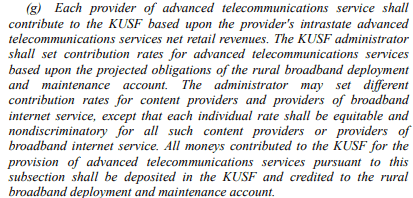

 Comcast took more than $1,000 out of a West Fargo, N.D., resident’s checking account, despite the fact she isn’t a customer and Comcast doesn’t offer cable service in North Dakota.
Comcast took more than $1,000 out of a West Fargo, N.D., resident’s checking account, despite the fact she isn’t a customer and Comcast doesn’t offer cable service in North Dakota.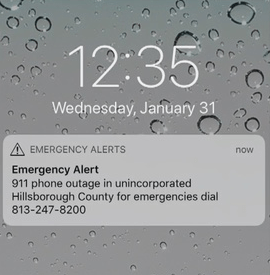 Several Bay Area counties in western Florida were without 911 service for several hours Wednesday after two failures at Frontier Communications left residents without any way to call for help.
Several Bay Area counties in western Florida were without 911 service for several hours Wednesday after two failures at Frontier Communications left residents without any way to call for help. The first outage was traced to routine network maintenance of CenturyLink/Level 3-owned equipment affected by a Florida road project near Clewiston. The second outage occurred because of a fiber cable cut.
The first outage was traced to routine network maintenance of CenturyLink/Level 3-owned equipment affected by a Florida road project near Clewiston. The second outage occurred because of a fiber cable cut.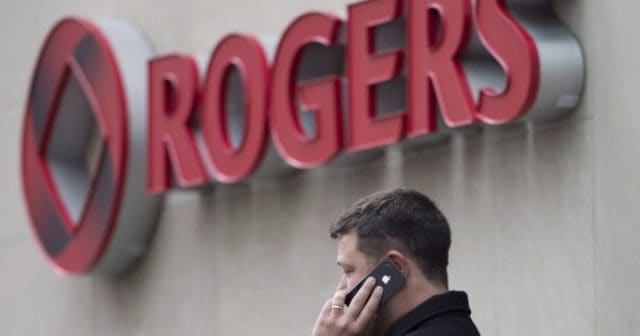 A special investigation by the Canadian Broadcasting Corporation found Rogers’ call center employees engaging in high pressure sales tactics, pushing customers to buy products and services they do not need.
A special investigation by the Canadian Broadcasting Corporation found Rogers’ call center employees engaging in high pressure sales tactics, pushing customers to buy products and services they do not need.

